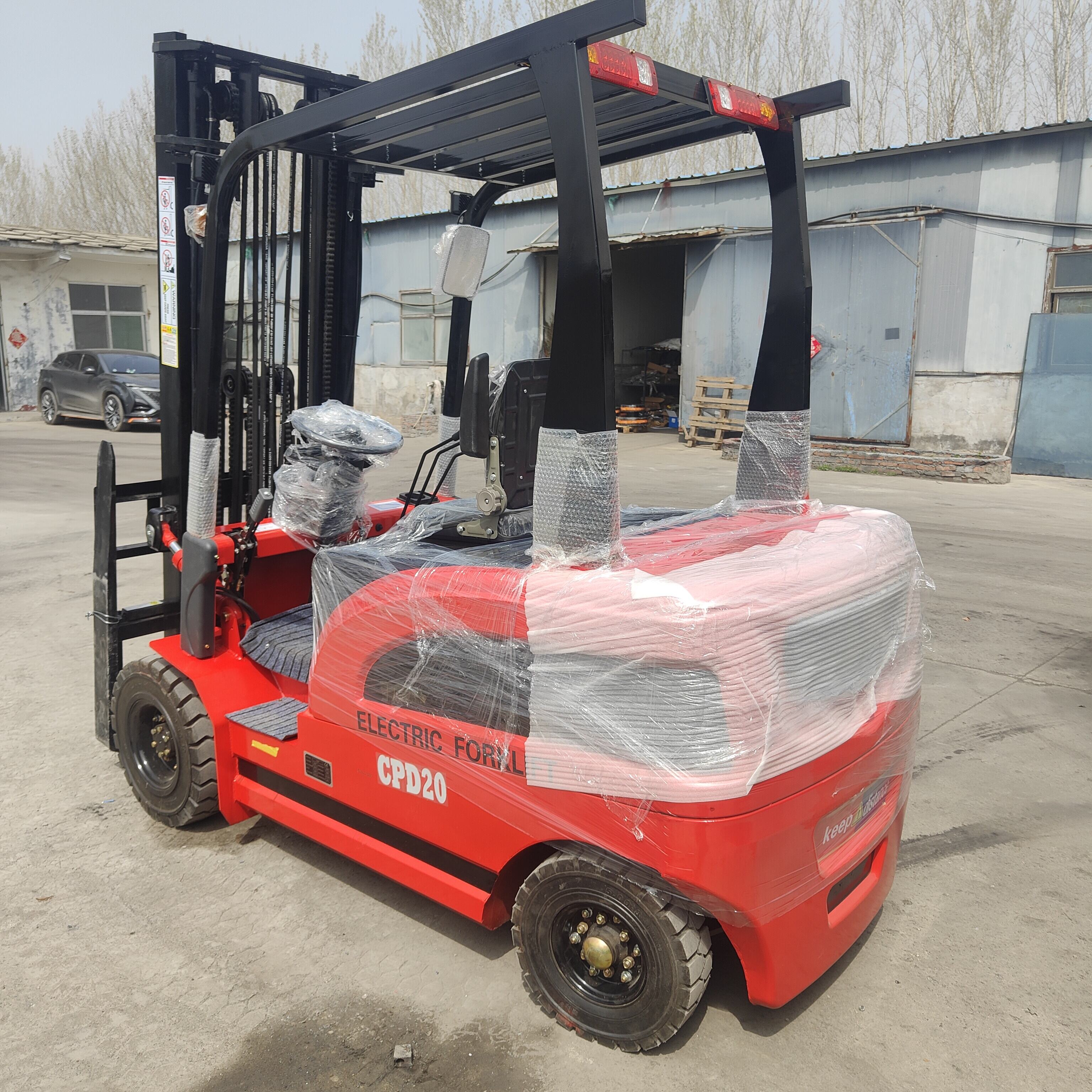Electric Forklifts: Efficient Material Handling Solutions for Modern Warehouses
Key Advantages of Electric Forklifts in Modern Warehousing
Zero Emissions and Environmental Impact
Warehouses across the country are seeing a shift toward electric forklifts as companies look to cut down on their environmental impact. Unlike traditional models, these electric versions don't spew out harmful fumes during operation, which means better air quality inside facilities where workers spend long hours. According to data from the International Energy Agency, switching over to electric options could slash greenhouse gases by around 25 percent. That kind of reduction makes a real difference when considering the massive scale of global warehousing operations. Many logistics managers report that while there was initial hesitation about performance, most find that electric forklifts maintain productivity levels while helping meet corporate sustainability goals.
Operational Cost Savings
Electric forklifts offer something pretty important to warehouse managers these days: money saved over time. Compared to those old school diesel models or the LPG ones that smell so bad after sitting outside all night, electric versions just don't eat through as much power. We're talking real dollars difference on monthly fuel bills alone. Another thing worth mentioning is how electric forklifts have way fewer parts inside them. That means mechanics spend less time tinkering around under the hood, which translates to fewer repair calls and longer equipment life. Warehouse operators tell us this can cut maintenance budgets by almost half in some cases. For companies trying to keep costs down while still getting the job done, these factors make electric forklifts an increasingly attractive option despite higher upfront prices.
Enhanced Safety Features
Electric forklifts pack some serious safety upgrades that really make a difference in the workplace. Operators get much better visibility around them compared to older models, plus they run way quieter than gas powered ones. This quiet operation means workers can actually hear each other talk without shouting over engine noise in busy warehouses. A lot of newer electric models also come standard with automatic brakes that kick in when something gets too close, along with systems that keep the truck stable on inclines. Warehouse managers report seeing fewer injuries since switching to electric equipment. The combination of these safety tech additions makes electric forklifts not just greener but genuinely safer options for today's logistics facilities.
Technological Innovations in Electric Forklift Trucks
IoT Integration for Fleet Management
Adding Internet of Things (IoT) tech to electric forklifts means managers can keep an eye on how these machines are performing right now, which changes how warehouses manage their fleets completely. Companies using this stuff actually see where their forklifts spend most of their time, when they're idle, or if certain areas need more equipment. This helps them move around their assets better and fix problems before breakdowns happen. What makes IoT really valuable is that it shows exactly what condition each truck is in, from battery levels to wear on parts. Warehouse managers get alerts when something looks off, so they can schedule maintenance instead of waiting for failures. The result? Less time wasted fixing broken machines and more productive hours getting work done across the facility.
Automated Navigation Systems
Automated navigation systems in modern electric forklifts significantly boost operational efficiency and accuracy in material handling. Facilities utilizing automated forklifts report dramatic productivity increases, with improvements reaching up to 30%. These systems facilitate precise maneuvering and minimize human error, streamlining processes and maximizing throughput in warehouses and logistics centers.
Advanced Battery Efficiency
Battery tech has come a long way lately, especially with lithium-ion batteries becoming the norm for electric forklifts. The newer batteries last much longer between charges and recharge way faster too. Some warehouses report their forklifts running almost double the time on one charge compared to old lead-acid models from just five years ago. Better battery life means workers spend less time waiting around for equipment to charge and more time actually getting work done. Warehouse managers see this as a game changer since downtime costs money and efficient operations translate directly into bottom line savings for businesses across industries.
Hightop Electric Forklift Solutions for Industrial Needs
CPD20 2Ton Customized Electric Forklift Trucks
The CPD20 2 Ton Custom Electric Forklift was designed to handle all sorts of industrial jobs thanks to its strong yet flexible build. Works great when moving heavy loads around warehouses or manufacturing plants where efficiency matters most. Built on a solid base made from Baosteel Q345 structural steel, this machine stands up to tough conditions day after day without breaking down. What really sets it apart are those smart touches like the adjustable steering wheel that reduces operator fatigue during long shifts, sensors that help control descent speed smoothly, and the specially designed door frame that gives operators better visibility around corners and tight spaces. All these features combine to make the CPD20 a reliable workhorse even in the toughest industrial settings.
2Ton Lithium-Powered Electric Forklift Trucks
The 2 Ton Lithium Powered Electric Forklift has become a favorite among warehouse managers thanks to its solid performance and much longer time between charges compared to traditional models. The lithium battery gives it impressive energy capacity, so most facilities can run operations all day without needing to recharge during shifts. What makes this machine really work well is that it maintains steady power throughout the workday, which means fewer interruptions when moving goods around busy warehouses. Equipped with an advanced MOSFET AC control system plus adjustable fork spacing options, this electric lift truck adapts nicely to different loading scenarios across manufacturing plants, distribution centers, and storage facilities alike. Many operators find these features make daily tasks smoother and faster than with older equipment.
Electric Forklift Price vs. Long-Term Value
Cost-Benefit Analysis of Electric Models
Most businesses looking at electric forklifts get hung up on the sticker price first off, since these machines typically cost more upfront than gas or diesel powered ones. But when we look at what happens down the road, the math changes pretty dramatically. Electric models save money in the long run because they just don't need as much maintenance. Fewer moving parts means no oil changes, less brake wear, and those expensive engine repairs become a thing of the past. The Forklift Truck Association did some numbers crunching and found that after five years on the floor, electric forklifts end up costing around 30 percent less overall compared to traditional models. Why? Well, electricity just doesn't burn through cash like fuel does, and those battery packs last way longer than combustion engines ever could. A lot of warehouses are finding this out the hard way as their old fleet gets worn out.
ROI in Warehouse Operations
Switching to electric forklifts brings more than just environmental benefits to warehouses. Companies are finding real money savings too. Electric models typically cut down on fuel expenses and maintenance costs because they have fewer moving parts compared to traditional gas powered ones. Some warehouse managers tell us they've seen their return on investment within just two to three years after making the switch. For instance, one distribution center saved around $15,000 annually simply by reducing battery replacements and fuel consumption. These machines work better in tight spaces and don't require lengthy charging breaks during shifts, which means workers can move goods faster without waiting around. That kind of efficiency makes electric forklifts a smart buy for any business wanting to streamline operations while keeping an eye on bottom line numbers over time.
Future Trends in Electric Material Handling
Growing Demand for Autonomous Forklifts
Automation has become a big deal lately, particularly with the introduction of self-driving electric forklifts meant to make warehouses work better. Take Amazon as an example they've been rolling out these machines across their facilities, and this has led to some serious market expansion. Industry analysts predict around 15% annual growth in this sector, showing how deeply entrenched automated equipment is becoming in warehouse operations. The benefits go beyond just making things faster these machines cut down on mistakes made by humans while maintaining consistent performance levels throughout shifts. Recent studies point to this technology being essential right now since online shopping continues to explode, creating unprecedented pressure on supply chains everywhere. For businesses wanting to keep up with competitors, getting onboard with autonomous forklifts isn't just smart it's almost necessary if they want to stay relevant in today's fast paced logistics environment.
Sustainability Initiatives Driving Adoption
More and more companies are turning to electric forklifts because sustainability has become such a big deal these days. Businesses just want greener options across the board. According to some studies from the World Economic Forum, companies going green with things like electric forklifts actually end up looking better to customers and making more money too. Switching makes sense when we think about our planet's future since these electric models don't emit anything at all and run much quieter than old fashioned gas powered ones. A lot of warehouse managers tell us they save money on fuel costs and maintenance while getting work done faster with electric forklifts. Companies aren't just following what customers want though. Going electric helps them stand out in their markets as responsible players who care about the environment without sacrificing bottom line results.


